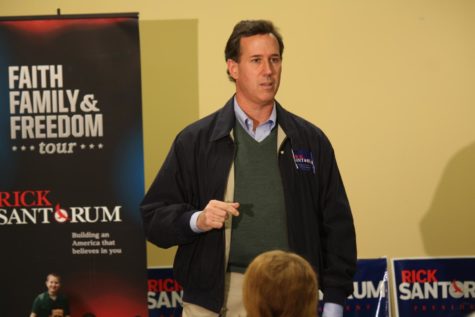Hentzel: Education in America
October 4, 2011
Friday I joined many other students, faculty, media and individuals from Ames in listening to 2012 Presidential Candidate Newt Gingrich. He is the kind of man whose name alone drew in people passing by. Parents, here for Family Weekend and tours with their children, stopped and sat down. Not many people get the chance to hear the former Speaker of the House, a man who has been involved in politics for so long.
He talked about his new “Contract with America,” which addresses points that he wants Americans and his own campaign to focus on, to bring to light and conquer common problems in our country. That contract is a mine of information; be sure to go to www.newt.org to check it out. I thought he brought up valid points, but what I have not been able to get out of my mind was when a man in the audience asked a question in terms of education.
The man brought up how in our schools today students are lacking critical thinking skills, as well as in areas of knowledge vital in the real world in terms of how to set up a bank account, pay bills on time, balance a checkbook, set up an interview, build a resume, etc.
Newt faced the audience and looked at the students, and asked a series of questions. “How many of you were bored in high school?” “How many of you just took what your teacher taught you for fact. Then when you asked questions in order to understand more, the subject was changed.” “How many of you could have graduated in 3 years?” The questions continued, and more and more students were raising their hands.
I was bored in high school, I was ready to move on my sophomore year, I took more and more upper level classes as a sophomore than the guidance counselor wanted, and yet I had to bring a novel to class so I could try to stay engaged. I am not saying this is anything against my fellow classmates, it was more of me being tired of filling in bubbles or the blanks that went along with textbook readings over the French Revolution. I learned just so I could pass the exam and then move on to the next subject in history or science.
What is scary is that many students in our generation do not know how to think beyond memorizing a phrase for a test or a bold faced definition or formula. Nor do we understand how to survive in the real world. Granted a vast majority do, but sometimes it takes a while to learn. People do not know how to build a resume, act in an interview or be financially stable.
Educating students in what it takes to survive in the real world would give students both the skills and confidence to approach situations like interviews and not walk out wondering what went wrong. It would give them time to focus on school, and not be concerned with suddenly not having money to pay for gas. Being able to be stable financially and knowing how to conduct a positive job interview can help lift the burden of wondering what is expected of you. Those skills should be integrated into the school system in business classes so students can know what to expect outside of their familiar town.
We need to become a country that does not learn to pass the next exam of True or False questions, or of multiple choice where the answers always seem to be C. We need to become a country that pursues knowledge with a hunger so that our minds are not so focused on facts that our fourth grade teacher taught us. Some go to college just to earn a paycheck, and we all worry about money in the future, but others go with the mind set of reaching out and helping others. Learning to give back sometimes consists of becoming a professor or a doctor who helps give aid to third-world countries. What we apply now, changes the world around us everyday, and that will always be bigger than a bubble on a bubble sheet.
Ask questions. How do we know that the earth revolves around the sun? Why was there a massacre in Tiananmen Square? Ask, so that you can get an answer that doesn’t start with “What does that have to do with the Boston Tea Party?” Ask so that you can finally pursue knowledge so that you can look at the world around you in a new appreciation, or even apply it, not just on paper with a pencil.








